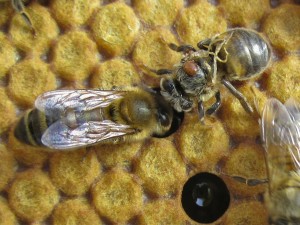Secrets of resistant varroa revealed
New research by Rothamsted has revealed the different gene mutations that have enabled varroa mites to become resistant to acaricides, including pyrethroids (such as the active ingredients of Apistan and Bayvarol). The findings have also helped explain Vita’s earlier observations about differing patterns of resistance across the world.
Tau-fluvalinate is a pyrethroid that can kill vulnerable mites by overstimulating their nervous systems. It interferes with sodium channel proteins that are involved in generating electrical signals in nerve cells.
Earlier research showed that resistance to tau-fluvalinate in central and southern England evolved through a mutation of a single base in the varroa’s DNA. This latest research has shown that a different mutation evolved in resistant varroa mites in the USA.
Dr Max Watkins, Technical Director of Vita (Europe) Ltd, explained: “In our ongoing studies of resistance to pyrethroids, we noticed that the pattern of resistance in the USA was different to that of the UK which was different again to that of continental Europe. We have long suspected that different mutations are responsible for these variations.
“In continental Europe, the graphs plotting the amount of tau-fluvalinate required to kill the mites over time were a very different shape to those in Britain. Investigations in the USA suggested a third pattern, that is, a third mutation, distinct from the first two. This new research has precisely identified the difference between the UK and USA evolutionary resistance paths.”
The practical implication for beekeepers is that resistance evolves only when mites are exposed to a single treatment type over many years. Therefore, by alternating treatments and using Integrated Pest Management techniques, as recommended by Vita, the evolution of resistance can be delayed or even prevented, enabling the first generation varroa-control products like Apistan using tau-fluvalinate to continue to be effective.
Watkins continued: “The Rothamsted researchers say they can now develop diagnostic screening tests to analyse individual mites for the presence or absence of the mutations. That would be extremely useful, although I suspect that these will have to be laboratory, rather than hive-side, tests. This is excellent work and we look forward to hearing more results from this study. Meantime, Vita plans to continue its monitoring of acaricide resistance in Europe.”
The Rothamsted research was carried out in collaboration with scientists working in Spain, the USA and Germany). The study is published in the journal PLOS ONE.
Notes To Editors
Vita (Europe) Limited is a mite control and honeybee health specialist. It is the world’s largest dedicated supplier of honeybee health products to the honey and pollination industries. With a rigorous and ethical approach to research and development into honeybee health, Vita has no commercial interests in crop pesticides or crop breeding that may be harmful to honeybees.
Vita researches, develops, and manufactures a range of honeybee health products. Its headquarters are in the UK, it has offices in Italy, France and Russia, and partners across the globe. These products are marketed internationally through a network of 60 distributors in 50 countries.
Vita’s honeybee health product range includes anti-varroa acaricides – Apistan® (outside the USA/Canada) and Apiguard® – chalkbrood and wax moth controls, foulbrood diagnostic kits and health-promoting feeds. Vita also supplies Asian hornet traps ,Small Hive Beetle traps and swarm lures. Vita products have been registered by more than 60 veterinary authorities.
Vita promotes sustainable beekeeping through Integrated Pest Management (IPM). Its treatments are designed to inhibit the build-up of resistance and wherever possible contain natural compounds and biological controls that are benign to all but the target pests.
Vita invests a very high proportion of its turnover in research and development. Research partners include universities such as Thessaloniki, Cardiff, Milan, Udine and Naples and institutes such as the FERA Laboratories in the UK and the USDA in America. Vita’s innovative research and development work has been recognised by and has received support from the UK Government.
As a result of its primary research of natural control agents, Vita is currently engaged in new projects exploring mite control in the agriculture, veterinary, and horticulture industries as well as public health and human allergen control.
See www.vita-europe.com for more information and a web app which can be accessed at www.healthybeeguide.com.
Follow Vita as “Vita (Europe) Ltd” on Facebook and Google+ and as @vitaeuropeltd on Twitter.
Media Enquiries
Stephen Fleming at Palam Communications
+44 (0) 1635 299116

